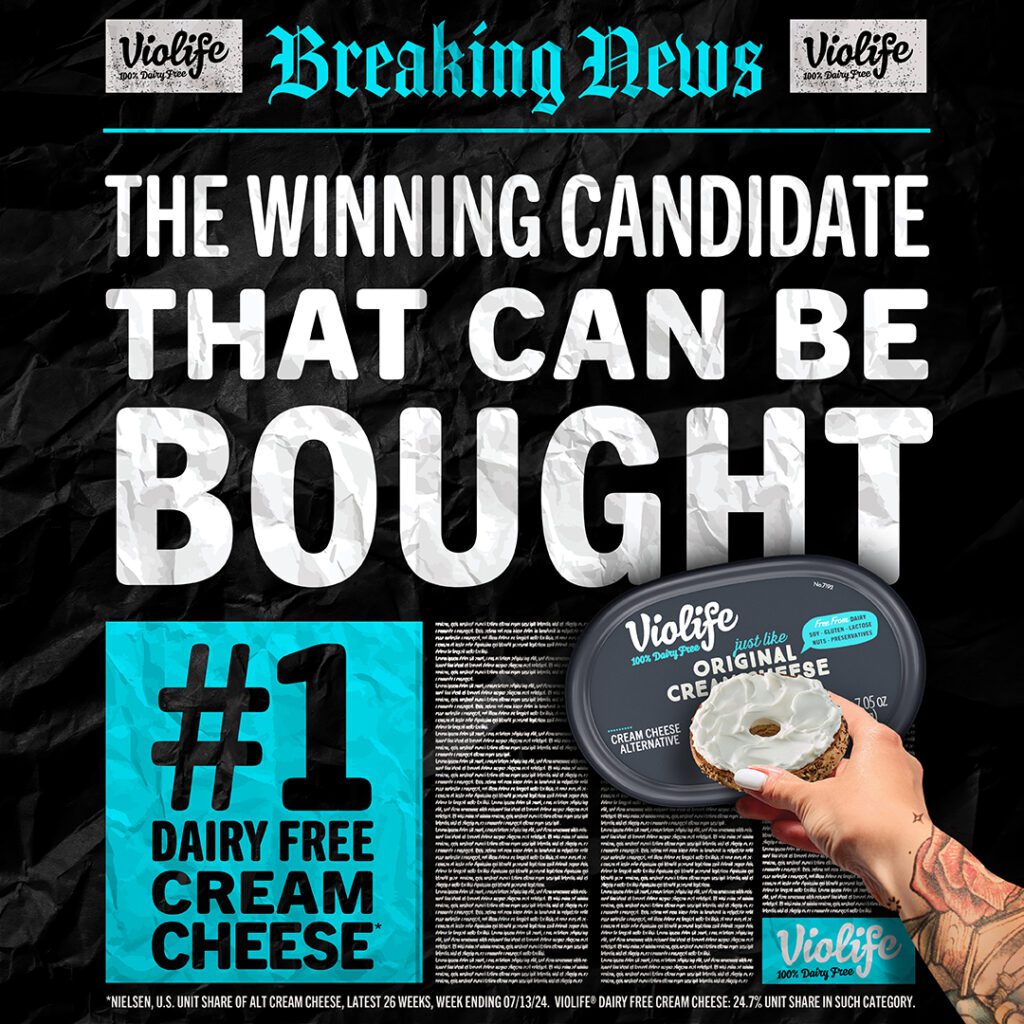When Violife’s dairy-free cream cheese earned the top spot in the U.S. within its category earlier this year, spreading the news was the logical next step. And the biggest event to tie it to, of course, was the presidential election.
Timing product news to election season is not the wisest move for most brands. But for Violife’s “America Has Voted” campaign, which included distributing free bagels and cream cheese on the morning of Election Day, cheeky OOH ads with slogans like “Our Winning Campaign Promise: No Bull,” and an election-style social video with a parodied victory speech, the brand bet on irreverent humor as a reprieve from political tensions.
We spoke with Olga Osminkina, Global President & Chief Growth Officer at Violife, about the campaign’s strategic goals, the challenges of marketing within the category, forthcoming brand innovations and leveraging humor to break through.
–
Chief Marketer: What were the strategic marketing goals of the “America Has Voted” campaign?

Olga Osminkina, Global President & Chief Growth Officer at Violife: The campaign itself is a way for us to put this winning product, our cream cheese, into conversation by tapping into a very potent and topical moment in American culture, which of course was election season. The goals of the campaign are tied to the overarching mission and objective we have of driving reconsideration for dairy-free, animal-free, plant-based products—in this case with the American public, but really with consumers around the world.
Many people tried dairy-free options for the first time a while back. And often, in those earlier days, dairy-free products were not necessarily standing up to the test of being liked by a broader public. You really had to have strong reasons to enjoy dairy-free, particularly dairy-free cheeses. Milk was a bit earlier [with creating] an inflection point; cheese is the last frontier in many senses for dairy-free categories—alternative dairy, if you will.
So, now that we have a product that is absolutely more than meeting consumer expectations, we wanted to make sure that the public knows about it. And given we are now the number one choice, why not shout about it? In 2024, the year was all about competitions. Think about the Olympics, think about the elections. We wanted to make sure people know that they also have a winning choice in dairy-free products, and that happens to be Violife cream cheese.
CM: Was there any hesitation about marketing around a contentious election season?
OO: We definitely took no sides. What we wanted to put out there into culture is a lighthearted, humorous way of celebrating election season. We felt like, if anything, our message and our activation will bring a little bit of lightheartedness and alleviate the pressure and the stresses of the season.
CM: The copywriting in this campaign, as well as your social media communications in general, is lighthearted, cheeky and fun. What is the strategy behind that choice, and how do you keep it consistent?
OO: First of all, thank you for recognizing it. It’s very important to us, that tone of voice. We do believe that taking the lighthearted, “not take yourself too seriously” approach, allows us [to be closer to] people who might even be new to plant-based, dairy-free, animal-free categories. And the way we go about keeping consistent and true to who we are is by being very clear, simple, practical and pragmatic about the tone of voice of our brand—but equally the purpose of our brand.
For us, whilst we want to be humorous, we want to also add value to people in everything we do—and add value not just by giving them an option to buy a great product, but also by solving [the issue of not compromising], particularly for dairy-free consumers. They have chosen a certain lifestyle, either due to more functional needs, dietary restrictions or emotional convictions, whether it’s animal welfare or sustainability concerns. We want to make sure those very important and charged subjects are solved by great products in a fun conversation.

CM: Can you discuss your plans for growth? And how will you make that happen from a marketing perspective?
OO: We are in a category that is poised for growth, yet it’s a category that historically, especially in more recent years, struggled for growth. And I think this is no secret. A number of publications have talked about the declines in animal-free, dairy-free, plant-based cheeses. However, Violife has really reignited that growth back. And we brought growth not just for the brand, but for the category this year by focusing on our winning cream cheese product.
As we look forward to next year and beyond, we remain committed to bringing the type of innovation to the market that would be solving that “non-compromise” between taste and nourishment and lifestyle choices of consumers. We want to make sure people understand that they no longer need to look at those choices as “either/or.” On the contrary, we will be bringing products to market that not just dairy-free consumers can enjoy. Everyone at the table can now [experience them] and not feel deprived.
A lot of that growth, as I mentioned already, will indeed come from better products, stronger claims and communication around those products. [That includes] meaningful changes in product performance and nutrition, but also in how we engage. “America Has Voted” is a great example of our tone of voice, but also our ability to put product communication in culture in a way that doesn’t feel forced, but actually feels more entertaining.
CM: Are you planning to go to new markets in the coming year and beyond?
OO: I will tell you as much as I can disclose, but Violife as a dairy-free, animal-free cheese as a brand is number one in the world. However, we are not settling. We are constantly evaluating which new geographies we can add to our roster. We are pretty much available across all of the continents, but in some continents we are more focused on growth versus simple availability, whilst in other markets we just distribute the product and there is some growth coming through.
But as you may know, dairy-free categories, animal-free categories, require education. They require a way of engaging with consumers so that they pay attention, and again, not see it as a compromise. In some geographies we focused on that more than in others. As we grow, as we expand, we’re constantly evaluating which markets to add to our focus zones. And beyond markets, of course, there are always conversations about channels, about types of product ranges and adjacencies to the brand. There is some big news coming in that adjacent space for us next year in North America. More on that in January.
CM: Can you define adjacent in this context?
OO: If you think about alternative dairy, or dairy-free, dairy-like products, there are many subcategories in that space. It’s not just cheese; it’s not just milk there, it’s creams, creamers, yogurt. We are constantly analyzing the space and understanding where it makes sense for us to enter, not just because there is a growth opportunity, but because there is something that we can add to the consumer’s repertoire that otherwise they feel like they’re not getting… [We are] very committed and investing constantly into R&D and technological breakthroughs to make sure that our products deliver.
CM: Taking it broader for a moment… A topic that’s come up in the industry of late is balancing performance and brand marketing. As a growth officer, how do you approach that at your company?
OO: I am a huge believer that brand building and performance marketing go hand in hand. It’s all a question of making sure that the message comes to life in an integrated fashion across touchpoints in a relevant way. If you think about the “America Has Voted” campaign, we actually tested different models in how we activated the campaign in different parts of the country. In Miami, in Austin—more emerging dairy-free cities—we have brought to life an integrated activation across different touchpoints, whether it’s in real life, digital, out of home, in store or shopper marketing and shopper media.
However, in some other parts of the country, we tested different touchpoints to see which ones deliver better ROI, and we will continue to track it—because it’s not just about an uplift in sales in the moment. It’s also a reset of the baseline, what we’re looking at… and how confident we are in its performance. We know that this product generates a very high repeat rate. So if we are successful in attracting trial in a meaningful way, we can predict what the repeat conversion [over a longer time period] will be. And that analysis is a constant in our company.
CM: So depending on the city, and depending on their level of exposure to dairy-free products, people will receive different messaging or different channels.
OO: Absolutely. And we are also very clear who our consumer is. We have studied our audience in depth. We understand where they live, how they behave, what they’re missing, what they’re lacking, what really makes them feel seen and makes them feel understood. And we put that knowledge to life.
CM: How do you see your industry evolving?
OO: I’m extremely excited about the future of the dairy-free, animal-free space, because unlike in the past, we are at the inflection point—particularly in the categories that are more emerging, like cheese, yogurts, even coffee creamers and creams. We are at a place in time where technology allows those products to really deliver on peoples’ expectations. And most importantly, the products finally allow our consumers—especially the ones who absolutely need their allergen-free choices—to feel like they don’t need to compromise and they can have that daily indulgence for themselves and those they love. To me it’s a huge win. And our job is to make sure more and more people know about it and reconsider it, because it’s no longer in the past. It’s a new era for this category.